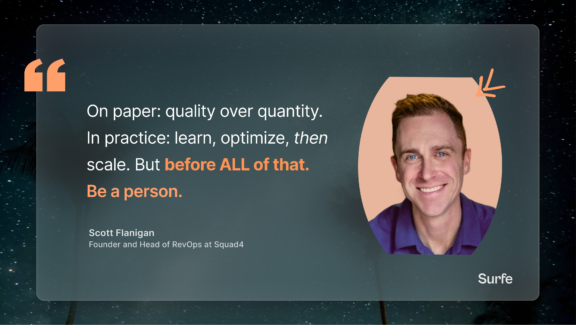Will AI Replace SDRs and BDRs?

AI is changing sales, reshaping traditional roles and improving on the processes and admin that comes with high volumes of calls and emails. With its ability to analyze large datasets, identify patterns, and automate repetitive tasks, AI has sparked discussions around the future of sales professions, particularly for Sales Development Representatives (SDRs) and Business Development Representatives (BDRs).
While some worry that AI will steal their jobs, certain salespeople are already adopting AI and reaping the benefits.
High performers are 1.9x more likely to use AI than under-performers.
This article will look at whether AI is a threat to these roles or an opportunity for evolution, freeing up time and removing pain points. We’ll explore what AI in sales means for SDRs and BDRs, aiming to demystify the impact of technology on these critical sales functions.
Key Takeaways:
- How SDRs/BDRs Can Use AI to Their Advantage
- What Areas of the SDR/BDR Role is AI Not Going to Replace?
- Balancing AI Input with Human Output
- Preparing for the future of AI in Sales
What Areas of the SDR/BDR Role Will AI Replace?
AI is set to transform the SDR and BDR landscape by automating tasks that are repetitive and data-intensive. This includes:
Outbound Lead Generation and Qualification: AI can sift through vast amounts of data to identify and qualify leads, streamlining the early stages of the sales funnel.
Email and Communication Automation: From drafting initial outreach emails to scheduling follow-ups, AI can manage routine communication, ensuring consistency and efficiency.
Data Entry and CRM Management: AI tools can automate the input of data into CRM systems, reducing manual errors and saving valuable time.
Performance Analysis: AI can analyze sales activities and outcomes, offering insights into what strategies are working and which need adjustment.
By taking over these tasks, AI allows SDRs and BDRs to focus on more strategic and creative aspects of their roles, such as personalizing customer interactions and developing sales strategies.
How SDRs/BDRs Can Use AI to Their Advantage
SDRs and BDRs can harness AI to enhance efficiency and focus on high-value tasks. By integrating AI into their workflows, they can automate routine activities like lead scoring, email drafting, and data entry. This not only saves time but also reduces the cognitive load, allowing sales representatives to dedicate more energy to personalizing client interactions and strategizing.
AI can be a powerful tool that amplifies the capacity of SDRs and BDRs to perform their roles with greater impact and less effort.
As AI becomes more widespread in the industry, SDRs and BDRs that can seamlessly use and integrate AI into their workflow will become more employable than those who can’t. Given the choice between a candidate who is able to enhance performance with AI, and a candidate that only uses traditional methods, employers will likely choose the former the majority of the time.
Scott Flanigan, Founder of Squad4, warned against letting AI have too much of an involvement in your sales prospecting process. For Scott, keeping the human aspect is vital. He stressed the importance of focusing on quality over quantity so your prospecting and outbound remains human. So use AI where you can to ave you time, but use that regained time to inject an extra human element into your sales.

What Areas of the SDR/BDR Role is AI Not Going to Replace?
Although AI will likely change the SDR/BDR role, humans will undoubtedly remain responsible for a wide array of tasks that require a personal touch, emotional intelligence, and strategic insight. Here’s a closer look at these tasks:
Human Connection: Creating a genuine connection with clients goes beyond algorithms. This involves understanding nuances in tone and context that AI cannot fully grasp.
Emotional Intelligence: Interpreting and responding to the emotional states of clients is crucial for effective communication and problem-solving, a skill that AI lacks.
Relationship Building: Developing and maintaining strong relationships is about trust and empathy, elements that require human intuition and understanding.
Strategic Decisions: While AI can provide data-driven insights, the responsibility of making complex strategic decisions lies with humans, who can consider broader implications and ethical considerations.
Purchasing Decisions: Guiding a client through the purchasing decision involves understanding their hesitations and motivations, which requires a human’s empathetic perspective.
One-on-One Calls for Demos: Personalized demonstrations and discussions about product fit and customization options require human interaction to adjust dynamically to the prospect’s reactions and questions.
These tasks underscore the indispensable role humans play in the nuanced and complex field of sales, blending AI’s capabilities with the irreplaceable human touch.
Balancing AI Input with Human Output
AI and humans will need to work together. AI can enhance operational efficiency while humans oversee critical decision-making and relationship management.
This balance is crucial because relying solely on AI presents risks such as misinterpretation of nuanced data, lack of personal touch in customer interactions, and potential ethical dilemmas in automated decisions. Humans can make mistakes, but they can also consider things a machine can’t. Human oversight ensures that the use of AI aligns with organizational values and meets complex customer needs, vital for relationship management which is key to sales.
Preparing for the future of AI in Sales
Salespeople will need to take a proactive approach to skill development when it comes to working with AI. For SDRs and BDRs, staying relevant in an AI-enhanced sales environment means embracing adaptability and continuous learning. Understanding how to leverage AI tools for routine tasks can free up time for more complex, human-centric activities.
To enhance employability, SDRs and BDRs should focus on cultivating skills that AI cannot replicate, such as emotional intelligence, strategic thinking, and relationship building.
Developing a deep understanding of AI capabilities and limitations will also enable sales professionals to effectively integrate these tools into their workflows, ensuring they complement rather than replace human input.
By staying informed about technological advancements and actively seeking opportunities to incorporate AI into their roles, SDRs and BDRs can position themselves as valuable assets in the evolving landscape of sales.
Let’s Wrap It Up!
In B2B sales, AI’s role is not to replace but to enhance SDR and BDR positions by automating repetitive tasks, allowing for a focus on high-value activities.
Embracing AI, sales professionals can bolster their employability, leaning on AI for efficiency while preserving the irreplaceable human touch in relationship building and strategic decision-making. The future lies in a balance between AI’s analytical power and human emotional intelligence, promising a more effective, personalized sales approach that benefits everyone.

Intelligent prospecting with Surfe
Save 13 hours per week when you automate CRM data entry with Surfe. Intelligent prospecting is here.
FAQs about AI replacing SDRs and BDRs
Will I lose my job in sales to AI?
There will always be a place for talented people in sales, especially for those seeking a career in the United States. AI can do a lot, but it can’t perform the human element which is absolutely vital for building and maintaining relationships.
How can I future-proof my sales job?
Like any job, the key to keeping it is to make yourself invaluable. Learning new skills, integrating with other teams, and building relationships will help distinguish you and ensure that you’re protected. Learning how to work with AI could make a big difference, and may well be a standard requirement for jobs in the future, like using email is today.
How can I learn more about AI?
If your team is already looking at using AI, your manager may be able to arrange training for you. If not, there are thousands of videos and podcasts from sales and business professionals that are all about AI and how you can use it to be even better at your job.


